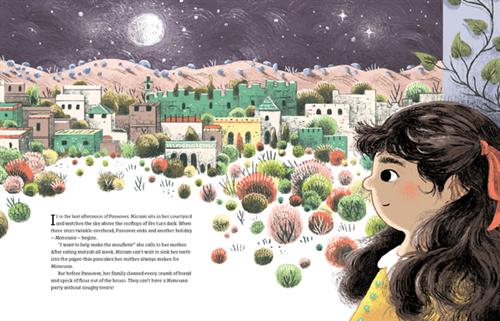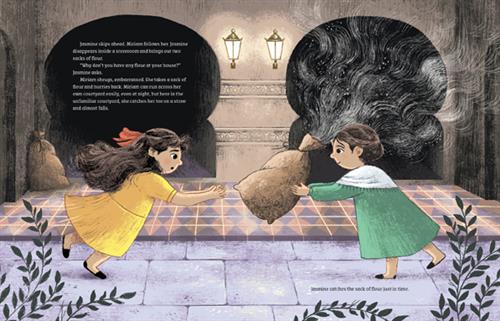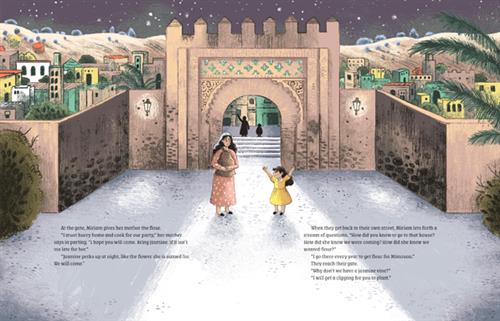Set in Morocco, this sweet story of friendship and shared customs between a Jewish family and their Muslim neighbors provides a great introduction to the Moroccan Jewish holiday of Mimouna.
It’s Mimouna — the Moroccan Jewish holiday that marks the end of Passover, and when blessings are given for a year of prosperity and good luck. Miriam wants to help her mother make the sweet moufletot pancakes they always eat at their Mimouna party, but after following the rules of Passover, they don’t have any flour in the house! So Miriam’s mother takes her to visit their Muslim neighbors, who are happy to share.
The women drink tea together, and Miriam makes friends with a young girl named Jasmine. Miriam almost drops the bag of flour when she and Jasmine go to fetch it from the storeroom — but luckily Jasmine is there to catch it! Jasmine and her family then join Miriam’s family and friends to celebrate Mimouna.
This sweet story of friendship and shared customs will introduce North American readers to the Mimouna holiday. The book concludes with an author’s note and a recipe for making moufletot, the sweet, paper-thin pancakes featured in the story, so that readers can enjoy, too.
Key Text Features
recipes
author’s note
Correlates to the Common Core State Standards in English Language Arts:
CCSS.ELA-LITERACY.RL.2.2
Recount stories, including fables and folktales from diverse cultures, and determine their central message, lesson, or moral.
CCSS.ELA-LITERACY.RL.2.6
Acknowledge differences in the points of view of characters, including by speaking in a different voice for each character when reading dialogue aloud.
Set in Morocco, this sweet story of friendship and shared customs between a Jewish family and their Muslim neighbors provides a great introduction to the Moroccan Jewish holiday of Mimouna.
It’s Mimouna — the Moroccan Jewish holiday that marks the end of Passover, and when blessings are given for a year of prosperity and good luck. Miriam wants to help her mother make the sweet moufletot pancakes they always eat at their Mimouna party, but after following the rules of Passover, they don’t have any flour in the house! So Miriam’s mother takes her to visit their Muslim neighbors, who are happy to share.
The women drink tea together, and Miriam makes friends with a young girl named Jasmine. Miriam almost drops the bag of flour when she and Jasmine go to fetch it from the storeroom — but luckily Jasmine is there to catch it! Jasmine and her family then join Miriam’s family and friends to celebrate Mimouna.
This sweet story of friendship and shared customs will introduce North American readers to the Mimouna holiday. The book concludes with an author’s note and a recipe for making moufletot, the sweet, paper-thin pancakes featured in the story, so that readers can enjoy, too.
Key Text Features
recipes
author’s note
Correlates to the Common Core State Standards in English Language Arts:
CCSS.ELA-LITERACY.RL.2.2
Recount stories, including fables and folktales from diverse cultures, and determine their central message, lesson, or moral.
CCSS.ELA-LITERACY.RL.2.6
Acknowledge differences in the points of view of characters, including by speaking in a different voice for each character when reading dialogue aloud.
| Published By | Groundwood Books Ltd — Oct 27, 2020 |
| Specifications | 36 pages | 8.2575 in x 10.625 in |
| Keywords | religion; traditions; celebration; neighborhood and community; overcoming differences; Passover; Muslim; Jewish; religious holidays; sharing; acceptance; tolerance; respect for community; inclusive; cooperation; summarizing; questioning; synthesizing; Common Core aligned; CC Literature Key Ideas and Details; CC Literature Craft and Structure; grade 1; grade 2; picture book; recipes; author's note; Morrocco; moufleta; matzah; Fes; Fez; Jerusalem; |
| Written By |
ALLISON OFANANSKY was born in the US and moved to Israel in 1996, where she lives in the village of Kaditah with her husband, Shmuel, and daughter, Aravah. She has previously written the Nature in Israel and How It’s Made series, and The Patchwork Torah, illustrated by Elsa Oriol, which won the National Jewish Book Award. She works as an editor/translator and volunteers with various organizations working on behalf of community, ecology, social justice and women’s issues. |
| Illustrated by |
ROTEM TEPLOW lives and works in Israel. She graduated from Shenkar College of Design in 2016. Her recent books include The Eternal Soldier, written by Allison Crotzer Kimmel, and Two Bears: An Epic Journey of Hope, written by Patricia Hegarty. She also does illustration work for newspapers and magazines. |
| Written By |
|
ALLISON OFANANSKY was born in the US and moved to Israel in 1996, where she lives in the village of Kaditah with her husband, Shmuel, and daughter, Aravah. She has previously written the Nature in Israel and How It’s Made series, and The Patchwork Torah, illustrated by Elsa Oriol, which won the National Jewish Book Award. She works as an editor/translator and volunteers with various organizations working on behalf of community, ecology, social justice and women’s issues. |
| Illustrated by |
|
ROTEM TEPLOW lives and works in Israel. She graduated from Shenkar College of Design in 2016. Her recent books include The Eternal Soldier, written by Allison Crotzer Kimmel, and Two Bears: An Epic Journey of Hope, written by Patricia Hegarty. She also does illustration work for newspapers and magazines. |
| Audience | ages 4 to 8 / grades K to 3 |
| Reading Levels |
Guided Reading O
Fountas & Pinnel Text Level O |
| Key Text Features | recipes; author's note |
| Common Core |
CCSS.ELA-LITERACY.RL.2.2
CCSS.ELA-LITERACY.RL.2.6 |
“This introduction to an important holiday and sharing will be a welcome addition to many collections.” — School Library Journal
“[A Sweet Meeting on Mimouna Night] does an excellent job of showing the interconnectedness of kind neighbors to one another.” — A Fuse #8 Production Blog
“This delightful story introduces the reader to a new community as well as a new holiday … The author and illustrator subtly pack large amounts of information into a gentle story.” — Association of Jewish Libraries
“[A] sweet and simple story.” — Vancouver Writers Fest




